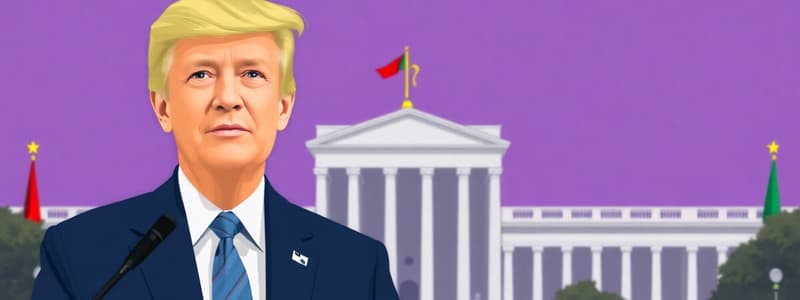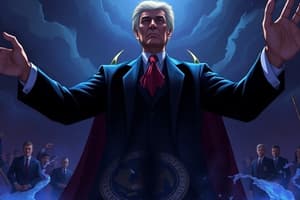Podcast
Questions and Answers
What is the definition of Executive Power?
What is the definition of Executive Power?
The executive power is responsible for the execution of laws and managing the state. It is bestowed upon a single person, such as the President.
What are the constitutional requirements for someone to become President of the Philippines?
What are the constitutional requirements for someone to become President of the Philippines?
- Must be a resident for 10 years immediately preceding the elections. (correct)
- Must be a member of a political party.
- Must be a registered voter. (correct)
- Must be a natural-born citizen of the Philippines. (correct)
- Must be at least 40 years old on election day. (correct)
The President of the Philippines can be re-elected for another term.
The President of the Philippines can be re-elected for another term.
False (B)
What happens when the President is temporarily incapacitated due to illness?
What happens when the President is temporarily incapacitated due to illness?
What is Executive Privilege?
What is Executive Privilege?
Which of the following are types of Executive Privilege?
Which of the following are types of Executive Privilege?
The President can change the salary of the Vice-President during their term.
The President can change the salary of the Vice-President during their term.
Explain the President's power over aliens?
Explain the President's power over aliens?
What is Eminent Domain and how does it apply to the government?
What is Eminent Domain and how does it apply to the government?
What are the three branches of the Philippine Government?
What are the three branches of the Philippine Government?
What are the functions of the Legislative Branch?
What are the functions of the Legislative Branch?
What are the requirements for someone to serve in the Senate?
What are the requirements for someone to serve in the Senate?
What is the difference between the Senate and the House of Representatives?
What is the difference between the Senate and the House of Representatives?
What is the primary purpose of Committees in the Senate?
What is the primary purpose of Committees in the Senate?
What are the responsibilities of the Secretary in the Senate?
What are the responsibilities of the Secretary in the Senate?
Explain the function of the Sergeant-at-Arms in the Senate?
Explain the function of the Sergeant-at-Arms in the Senate?
What is the Lower House in the Philippine Government?
What is the Lower House in the Philippine Government?
What are the requirements for someone to be elected to the House of Representatives?
What are the requirements for someone to be elected to the House of Representatives?
What is the primary function of the Judicial Branch in the Philippine Government?
What is the primary function of the Judicial Branch in the Philippine Government?
The Judicial Branch only consists of the Supreme Court.
The Judicial Branch only consists of the Supreme Court.
What are the key functions of the Supreme Court in the Philippines?
What are the key functions of the Supreme Court in the Philippines?
How is the Chief Justice of the Supreme Court appointed?
How is the Chief Justice of the Supreme Court appointed?
What is the role of the Judicial and Bar Council (JBC) in the Philippines?
What is the role of the Judicial and Bar Council (JBC) in the Philippines?
What is Decentralization in the Philippine Government?
What is Decentralization in the Philippine Government?
What is the role of the Local Government Code of 1991 (RA 7160) in the Philippines?
What is the role of the Local Government Code of 1991 (RA 7160) in the Philippines?
Which of the following are examples of Local Government Units (LGUs) in the Philippines?
Which of the following are examples of Local Government Units (LGUs) in the Philippines?
What are the primary responsibilities of a Barangay Captain in the Philippines?
What are the primary responsibilities of a Barangay Captain in the Philippines?
What is the primary difference between a City and a Municipality in the Philippines?
What is the primary difference between a City and a Municipality in the Philippines?
What is the primary role of the Sangguniang Panlalawigan (Provincial Council)?
What is the primary role of the Sangguniang Panlalawigan (Provincial Council)?
What are the responsibilities of the Governor of a Province in the Philippines?
What are the responsibilities of the Governor of a Province in the Philippines?
What is the primary role of a Mayor in a City or Municipality?
What is the primary role of a Mayor in a City or Municipality?
What is the role of the Sangguniang Bayan (Municipal Council) in the Philippines?
What is the role of the Sangguniang Bayan (Municipal Council) in the Philippines?
What is the role of the Sangguniang Panlungsod (City Council) in the Philippines?
What is the role of the Sangguniang Panlungsod (City Council) in the Philippines?
What is the role of the Sangguniang Barangay (Barangay Council)?
What is the role of the Sangguniang Barangay (Barangay Council)?
What is the role of the Commission on Elections (COMELEC) in the Philippines?
What is the role of the Commission on Elections (COMELEC) in the Philippines?
What is meant by the term 'suffrage' in the Philippine Constitution?
What is meant by the term 'suffrage' in the Philippine Constitution?
What are the qualifications for a Filipino citizen to be eligible to vote in the Philippines?
What are the qualifications for a Filipino citizen to be eligible to vote in the Philippines?
What is the purpose of the party-list system in the Philippines?
What is the purpose of the party-list system in the Philippines?
What is the difference between a formal and an informal institution?
What is the difference between a formal and an informal institution?
What is the role of civil society organizations (CSOs) in the Philippines?
What is the role of civil society organizations (CSOs) in the Philippines?
What are the main functions of educational institutions in the Philippines?
What are the main functions of educational institutions in the Philippines?
What is the difference between a social movement and a social group?
What is the difference between a social movement and a social group?
What is the primary function of the National Youth Commission (NYC) in the Philippines?
What is the primary function of the National Youth Commission (NYC) in the Philippines?
What is the purpose of the Sangguniang Kabataan (SK) in the Philippines?
What is the purpose of the Sangguniang Kabataan (SK) in the Philippines?
What is citizenship?
What is citizenship?
How can someone acquire Philippine citizenship?
How can someone acquire Philippine citizenship?
What is the principle of 'Jus Soli' in relation to citizenship?
What is the principle of 'Jus Soli' in relation to citizenship?
What is the principle of 'Jus Sanguinis' in relation to citizenship?
What is the principle of 'Jus Sanguinis' in relation to citizenship?
How can someone regain Philippine citizenship after losing it?
How can someone regain Philippine citizenship after losing it?
What is the role of the National Youth Commission in promoting youth empowerment and development in the Philippines?
What is the role of the National Youth Commission in promoting youth empowerment and development in the Philippines?
Flashcards
Executive Power
Executive Power
The power to enforce laws and manage the state.
Permanent Vacancy
Permanent Vacancy
Vacancy in office due to death, permanent disability, impeachment, or permanent incapacity.
Temporary Vacancy
Temporary Vacancy
Vacancy in office when the President is temporarily incapacitated.
Voluntary Temporary Vacancy
Voluntary Temporary Vacancy
Signup and view all the flashcards
Involuntary Temporary Vacancy
Involuntary Temporary Vacancy
Signup and view all the flashcards
Presidential Qualifications
Presidential Qualifications
Signup and view all the flashcards
Executive Order
Executive Order
Signup and view all the flashcards
Administrative Order
Administrative Order
Signup and view all the flashcards
Proclamation
Proclamation
Signup and view all the flashcards
Memorandum Order
Memorandum Order
Signup and view all the flashcards
Memorandum Circular
Memorandum Circular
Signup and view all the flashcards
General/Special Orders
General/Special Orders
Signup and view all the flashcards
Legislative Power
Legislative Power
Signup and view all the flashcards
Judicial Power
Judicial Power
Signup and view all the flashcards
Senate
Senate
Signup and view all the flashcards
House of Representatives
House of Representatives
Signup and view all the flashcards
Terms of Office (President/VP)
Terms of Office (President/VP)
Signup and view all the flashcards
Eminent Domain
Eminent Domain
Signup and view all the flashcards
Executive Privilege
Executive Privilege
Signup and view all the flashcards
Hearings
Hearings
Signup and view all the flashcards
Power of Appointment
Power of Appointment
Signup and view all the flashcards
General Supervision over Local Governments
General Supervision over Local Governments
Signup and view all the flashcards
Local Government Code (RA 7160)
Local Government Code (RA 7160)
Signup and view all the flashcards
Citizen
Citizen
Signup and view all the flashcards
Impeachment
Impeachment
Signup and view all the flashcards
Study Notes
Executive Power
- Responsible for executing laws and managing the state
- Held by a single person (e.g., the President)
- Includes implementing policies, managing administration, and maintaining law and order
- Controls the military and police
- Responsible for enforcing laws set by a legislative body
Vacancy Rules
- Permanent Vacancy: Occurs due to death, permanent disability, or permanent incapacity via impeachment
- Temporary Vacancy: Occurs when the President is temporarily incapacitated
- Voluntary: President declares incapacity, allowing the Vice President to act
- Involuntary: Majority of the Cabinet declares incapacity, requiring Congressional approval
Vice President Vacancy
- In case of permanent vacancy, the President appoints a new Vice President from Congress, subject to confirmation
Executive Order No. 464
- Issued September 28, 2005
- Ensures separation of powers and adherence to executive privilege in legislative inquiries
Executive Privilege
- Covers confidential information between the President and public officials
- Includes military, security, diplomatic, national Cabinet matters, and discussions
Types of Executive Privilege
- State Secrets Privilege
- Presidential Communications Privilege
- Deliberative Process Privilege
Limits to Executive Privilege
- Judicial review: Courts can review executive privilege claims
Presidency Qualifications
- Natural-born citizen of the Philippines
- Registered voter
- At least 40 years old on election day
- Resident for 10 years immediately before the elections
- No re-election for the President
- Cannot have served more than four previous presidential terms
Terms of Office
- President and Vice President serve a total of 6 years each
- No re-election for the President
- Vice President serves temporarily if the President dies or becomes disabled until a new President is chosen
- The Senate President or Speaker of the House may act as President in certain situations
Studying That Suits You
Use AI to generate personalized quizzes and flashcards to suit your learning preferences.




